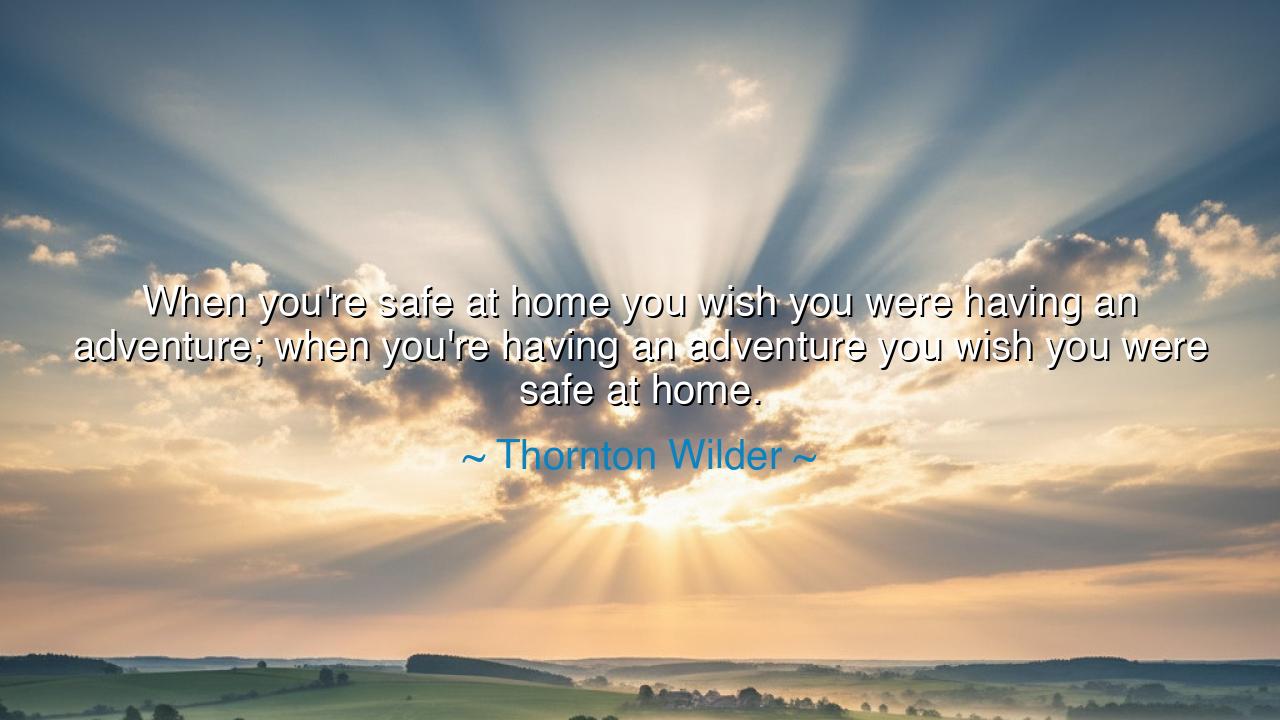
When you're safe at home you wish you were having an adventure;
When you're safe at home you wish you were having an adventure; when you're having an adventure you wish you were safe at home.






“When you're safe at home you wish you were having an adventure; when you're having an adventure you wish you were safe at home.” Thus spoke Thornton Wilder, the great American playwright and philosopher of the human heart. His words ring like a quiet bell of truth — not loud, but resonant, echoing across the chambers of every soul that has ever longed for something beyond its reach. In this paradox, Wilder captures the restless nature of human desire, the eternal dance between comfort and longing, between the peace of home and the thrill of the unknown.
The origin of this quote lies in Wilder’s profound understanding of the human condition. His works, such as Our Town and The Bridge of San Luis Rey, dwell on the beauty and fragility of ordinary life — the kind of life we too often overlook while dreaming of grander things. Wilder saw clearly that man is never still within himself. When life feels steady and safe, he yearns for movement, for risk, for the call of destiny. Yet when he finds himself amidst the storm — the adventure he once sought — he longs for the quiet hearth, the familiar faces, the safety he left behind. Such is the contradiction of the heart: it forever chases what it does not possess, not realizing that both peace and peril are threads in the same divine tapestry.
To be “safe at home” is to live in the circle of the known — a world of security, warmth, and order. Yet within that circle, the soul begins to itch. It looks beyond the walls and wonders what lies in the wide world — what winds blow beyond the mountains, what mysteries dwell in the seas. This longing for adventure is not folly; it is the sign of life’s fire within us, the same spirit that drove explorers to cross oceans and poets to dream of stars. But when the voyage begins, when the wind howls and the night grows cold, the heart remembers the sweetness of home — the steady flame of the hearth, the soft voice of safety. Wilder reminds us that both states are necessary, and both are incomplete without the other.
Consider the story of Odysseus, the wandering hero of old. For ten years he fought the Trojan War, and for ten more he struggled to return home. While away, he longed for Ithaca, for his wife Penelope, for his hearth. But had he remained there all his days, would he have known the full measure of life? His adventures made his homecoming sacred; his sufferings taught him the worth of peace. Thus, in every human journey, there is the same truth — that adventure gives meaning to home, and home gives purpose to adventure. Without one, the other is hollow.
Thornton Wilder understood that life itself is this rhythm — a continual ebb and flow between safety and challenge, between the yearning to expand and the longing to return. When we are young, we crave the adventure of becoming; when we are old, we crave the peace of having been. The wise man learns to accept both, knowing that one leads naturally to the other. Even in stillness there is movement, and even in the whirlwind, the memory of stillness abides. The art of living is not to escape this tension, but to embrace it — to find harmony in the ceaseless shifting of the human spirit.
And yet, the quote also carries a gentle warning. Wilder tells us that contentment cannot be found in circumstance alone. Whether we sit by the fire or stand upon the edge of the unknown, the root of our peace must lie within. For if we are always wishing for what is not, we are never truly alive. The moment we learn to be fully present — to find wonder in the familiar and calm in the uncertain — we step beyond the cycle of wanting. Then both home and adventure become one and the same, both doorways to understanding.
The lesson, then, is this: cherish both the quiet and the quest. When you are safe, do not despise peace; when you are challenged, do not fear the storm. For both are gifts of life, each preparing you for the other. Take risks, but remember where your roots lie. Rest, but do not let comfort dull your courage. And when the heart pulls in two directions, remember that it is the tension between them that keeps it alive.
So live as the wise have lived: grateful for the home that shelters you, and grateful for the adventure that awakens you. For as Thornton Wilder teaches, every soul walks the path between the hearth and the horizon — forever longing, forever learning, and forever blessed by both the longing and the return.






AAdministratorAdministrator
Welcome, honored guests. Please leave a comment, we will respond soon